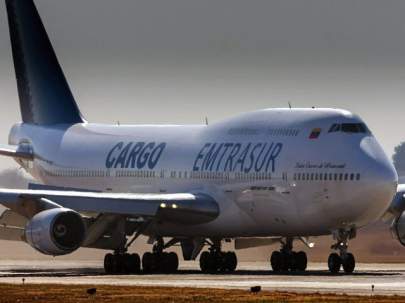Venezuela Regime Protests Fail to Deter Seizure of Plane Suspected of Iran Terror Ties

CARACAS, Venezuela — The government of Argentina officially seized a Venezuelan-Iranian cargo airplane on Thursday that had been detained alongside its crew since June.
A federal Argentine court approved the motion following an official request from the United States government, fueling accusations that the Iranian citizens that form part of the crew may have ties to international terrorism. The FBI is set to carry out an inspection of the plane.
On June 6, the now-seized airplane, a Boeing 747-300 (registration code YV353) belonging to Venezuela’s Emtrasur, landed in Argentina’s Ezeiza International Airport from Mexico with auto parts in its cargo hold. Emtrasur is a cargo company established by Venezuela’s socialist dictator Nicolás Maduro via a decree in November 2020 to import and export cargo between Venezuela and Asian, Middle East, and American nations. Emtrasur functions as a subsidiary of the state-owned Conviasa airline, sanctioned by the U.S. Department of Treasury in February 2020.
As Infobae reported in June, the Emtrasur cargo company functions as a ghost company. It does not have a public telephone number nor social media presence, unlike the parent company, Conviasa.
On June 8, two days after the plane landed in Argentina, Emtrasur’s Boeing attempted to depart towards Uruguay for refueling. Uruguay revoked the overflight permit, forcing the airplane to return to Argentina. Uruguay’s response prompted Argentine authorities to conduct an investigation on the plane and its crew, composed of 14 Venezuelan nationals and five Iranians.
The investigation centered around the airplane’s pilot, Gholamreza Ghasemi, suspected to be part of the Islamic Revolutionary Guard Corps (IRGC)-Qods Force, a U.S.-designated terrorist organization and official wing of the Iranian armed forces. Argentina has accused members of the Quds Force — the international terror wing of the IRGC — to be behind the 1994 bombing of the Argentine-Israel Mutual Association (AMIA) Jewish center, the deadliest terrorist attack in the history of the South American country and in the hemisphere prior to September 11, 2001.
Argentine authorities found media on Ghasemi’s phone related to leaders of the Islamic Revolutionary Guard Corps and the Quds Force, including pictures of Mohsen Rezai, one of the individuals believed responsible for the AMIA bombing. Argentina released 12 of the 19 crew members on August 2. Ghasemi, alongside the rest of the crew — 3 Iranians and 3 Venezuelans — currently remains detained in Argentina.
Prior to its arrival in Argentina, the plane had conducted a flight in May from Caracas, Venezuela, to Ciudad del Este, Paraguay, a city located near the tripartite border between Argentina, Brazil, and Paraguay. The airplane, and its Iranian-Venezuelan crew, raised the concerns of the Paraguayan authorities, who launched an investigation of their own in June.
Following the results of Paraguay’s investigation, the president of that country, Mario Abdo Benítez, claimed on June 29 that a significant part of the airplane’s crew has ties to international terrorism, claiming that “one of them, even, got surgery to change his face in Cuba.”
“Paraguayan intelligence did a great job to be able to determine the danger of this flight and since Paraguay reported and alerted, inquiries could be made,” President Abdo Benítez added.
The United States Department of Justice formally requested the seizure of the plane on August 2, stating that the Boeing airplane originally belonged to Iran’s Mahan Air, which transferred it to Emtrasur, an act that constitutes a violation of U.S. sanctions imposed on the Iranian airline since 2008. The Justice Department also asserted that Mahan Air is affiliated with the IRGC.
Maduro responded to the incident by throwing a tantrum on live tv on Monday.
“We are very pissed off about what is happening in Argentina, very pissed off, and very indignant about the theft of the plane in Argentina!” Maduro yelled during a mandatory broadcast.
The Maduro regime immediately organized rallies on Tuesday to protest against both the governments of Argentina and the United States over the seized airplane. It is worth mentioning that these rallies are filled with public sector workers and beneficiaries of Maduro’s handout programs, meaning attendance is mandatory lest they risk losing their jobs and the handouts they depend on.
Venezuela’s National Assembly, seized by the Maduro regime in a fraudulent election in 2020, accused the government of Argentina and its leftist president, Alberto Fernández, of being “puppets” of the United States, claiming that there will be no further negotiations between the socialist regime and the Venezuelan opposition until the seized airplane is returned.
The Venezuelan regime also sent Conviasa workers and Socialist Party members outside the Argentine embassy in Caracas on Thursday to protest, demanding the airplane be released back to Venezuela.
“Return the plane, with its crew,” the protesters chanted.
Argentina responded to the socialist regime’s tantrums on Thursday by saying that the situation with the seized airplane “is not a diplomatic incident.”
“We understand that they are expressions of different actors in Venezuelan life, as many times actors in Argentine life have had very strong expressions regarding Venezuela, and that does not imply a diplomatic incident has happened,” said the spokeswoman for the presidency, Gabriela Cerruti, in a news conference.











